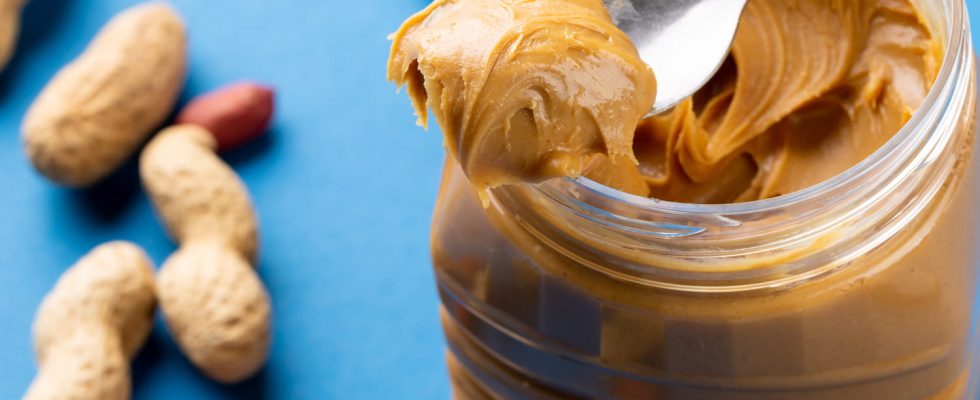Peanut butter is a peanut paste which is very rich in fats (lipids) and which, in excess, makes you gain weight. But it is interesting as an alternative to butter and oil and to regulate the appetite.
On the pancakes, porridge, a banana, in cakes or savory dishes… The peanut butter at the coast and it is particularly popular with athletes. This peanut paste would contain good fats and other nutritional elements which would be interesting for health. Should you eat it? The morning ? Before sports? Every day ?
What health benefits?
Peanut butter is a soft, protein-rich food invented by a Canadian pharmacist in the 19th century and first used in the United States for patients who suffered from dental problems and could not chew meat. This paste is made from peanuts, a plant whose the fruit is called the peanut. Even though it is very high in calories (588 calories per 100g), peanut butter has health benefits:
→ It is “a very important source of vegetable proteins“, first points out dietitian Ilona Benjamin, whom we interviewed. Peanut butter can therefore be “a good substitute for animal proteins”.
→ He is rich in lipids. This is “good fats, such as monounsaturated fatty acids, necessary to fight cholesterol”, reassures the interviewee. “Peanut butter is lower in calories than butter and oil,” she also indicates.
→ Rich in fiber, it allows you to “feeling a feeling of satiety, and therefore regulating the appetite”.
→ “Her glycemic index is low : blood sugar level does not increase quickly” (unlike fast sugars).
→ Peanut butter is also one of the foods richest in resveratrol, an antioxidant with many virtues, which helps in particular to fight against cardiovascular diseases.
→ It also contains biotin (vitamin B₈), which protects the skin from cellular oxidation. “Plant proteins and good fats ensure hydration of the skin and scalp”, completes the dietitian.
How many calories does it contain?
“We count 588 calories per 100 grams (we consider that a serving of peanut butter represents 20g (or 2 heaping teaspoons) and it contains 117 calories). If the caloric intake of peanut butter remains considerable, this food can be a good substitute for fat. Because for butter, for example, there are 741 calories per 100 grams, and for oil, 900 calories per 100 grams. develops Ilona Benjamin. In detail, 100 grams of peanut butter contains:
- 25 grams of protein (for comparison, 100 grams of chicken breast contains between 22 and 25 grams),
- 16 grams of carbohydrates,
- and 52 grams of lipids, including 26 grams of monounsaturated fatty acids (Omega-9) and 13 grams of polyunsaturated fatty acids (Omega-3, Omega-6).
What is the maximum amount per day?
“We recommend between 10 and 20 grams of peanut butter per dayif this consumption is an alternative to fats”, informs the interviewee. “But these recommendations can change depending on the person and their needs.”
Bad for your health in excess?
“Like any food, in excess, peanut butter can make you gain weight” she warns. For example, if a subject consumes between 50 and 60 grams of this paste each day, their weight will inevitably increase.
Contraindications and allergies
“Peanut butter is contraindicated in cases of tree nut and peanut allergies“, reminds the dietitian. This peanut paste is also a food rich in oxalates. It is, for this reason, not not recommended for people suffering from kidney stones. On the other hand, peanut butter contains neither lactose nor cholesterol: it is therefore not prohibited for people who are intolerant to either.
“If he is natural and organic, peanut butter does not present any dangers“, reassures the specialist, who therefore recommends choosing one that ticks these two conditions. “But if it is industrial, the peanut will be crushed, roastedsugar, salt and palm oil will be added. This palm oil will be hydrogenated, and will then create trans fatty acids (ACT), which contribute to the development of cholesterol.
Thanks to Ilona Benjamin, dietician in Marseille (ninth arrondissement) and author of the nutritional advice Instagram account “Ilona Nutrition”.
